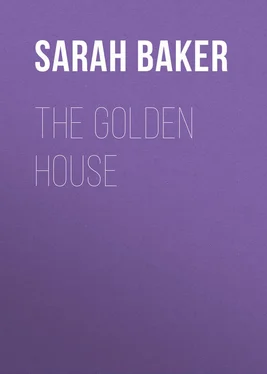Sarah Baker - The Golden House
Здесь есть возможность читать онлайн «Sarah Baker - The Golden House» — ознакомительный отрывок электронной книги совершенно бесплатно, а после прочтения отрывка купить полную версию. В некоторых случаях можно слушать аудио, скачать через торрент в формате fb2 и присутствует краткое содержание. Жанр: foreign_antique, foreign_prose, foreign_children, на английском языке. Описание произведения, (предисловие) а так же отзывы посетителей доступны на портале библиотеки ЛибКат.
- Название:The Golden House
- Автор:
- Жанр:
- Год:неизвестен
- ISBN:нет данных
- Рейтинг книги:3 / 5. Голосов: 1
-
Избранное:Добавить в избранное
- Отзывы:
-
Ваша оценка:
- 60
- 1
- 2
- 3
- 4
- 5
The Golden House: краткое содержание, описание и аннотация
Предлагаем к чтению аннотацию, описание, краткое содержание или предисловие (зависит от того, что написал сам автор книги «The Golden House»). Если вы не нашли необходимую информацию о книге — напишите в комментариях, мы постараемся отыскать её.
The Golden House — читать онлайн ознакомительный отрывок
Ниже представлен текст книги, разбитый по страницам. Система сохранения места последней прочитанной страницы, позволяет с удобством читать онлайн бесплатно книгу «The Golden House», без необходимости каждый раз заново искать на чём Вы остановились. Поставьте закладку, и сможете в любой момент перейти на страницу, на которой закончили чтение.
Интервал:
Закладка:
The church was even more peculiar within than without. It was white everywhere – walls, ceiling, and the plain massive pillars of strong masonry on which rested the low round arches. It looked more like a crypt under some great building than if it were itself the temple. The small windows, crossed by iron gratings, added to the prison-like effect of the whole. It was but a prison for the air of the latest summer days, shut in there to greet the worshippers, instead of the chill that might have been expected.
Warm was the atmosphere, and warm the colouring of the heraldic devices telling in armorial language what noble families had there treasured their dead. The altar, without chancel-rail, stood on a crimson-covered platform. On each side of it, at a respectful distance, were two stately monuments, on which two marble heroes were resting, one in full armour, and the other in elaborate court-dress. Alma could see that there were many names on the largest of these monuments, and her eyes filled with tears as she saw her mother's dear name, freshly cut below the list of her honoured ancestors.
The father did not look at the monument, or round the church at all. With eyes cast down, he entered a long wide pew, with a heraldic device on the light arch above the door. Prudently first placing little Frans at the end of the bare bench, he took his place, with Alma on the other side of him.
The church was almost empty. A few old bald-headed peasants were scattered here and there, and on the organ-loft stairs clattered the thick shoes of the school children, who were to assist in the singing.
The father bowed his head too long for the opening prayer. Alma understood that he had forgotten himself in his own sad thoughts. Her little slender hand sought his, that hung at his side, and her fragile figure crowded protectively towards him.
Meanwhile Frans had produced two bonbons, wrapped in mourning-paper, and with hour-glasses and skeletons gloomily pictured upon them. He was engaged in counting the ribs of the skeletons, to make sure that the number was the same on both, when Alma caught sight of him. The gentle, loving look in her face changed suddenly to one of sour reproof. She motioned disapprovingly to Frans, and vainly tried to get at him behind the rigid figure of her father. Before her very eyes, and in smiling defiance, the boy opened the black paper and devoured the sweets within, with evident relish, bodily and spiritual.
At this moment there was a stir in the vestibule and in the sacristy adjoining, and then a murmur of low, hushed voices, and for a moment the tramping of many little feet.
Alma looked around her, and now noticed on the platform for the altar a small white-covered table, and upon it a little homely bowl and a folded napkin. Beside the table a gray-haired old clergyman had taken his place. In one hand he held officially a corner of his open white handkerchief, while in the other was a thin black book.
There was a slight shuffling first, and then a tall man, with apparently a very stout woman at his side, came up the aisle and stood in front of the clergyman.
"It cannot be a wedding," thought Alma, accustomed to the splendid fonts of the churches of great cities; she could not suppose that simple household bowl was for a baptism. The broken, disabled stone font she did not notice, as it leaned helplessly against the side wall of the building.
The clergyman opened his book and looked about him, doubtfully turned over the leaves, and then began the service "for the baptism of a foundling," as the most appropriate for the present peculiar circumstances that the time-honoured ritual afforded.
At that moment Karin threw open her shawl, and showed the little brown baby asleep in her arms. Alma's attention was fixed, and Frans was all observation, if not attention.
"Beloved Christians," began the pastor; he paused, glanced at the scattered worshippers, and then went on, "our Lord Jesus Christ has said, 'Except a man be born of water and of the Spirit, he cannot enter into the kingdom of God.' We do not know whether this child has been baptized or no, since, against the command of the heavenly Father, and even the very laws and feelings of nature, he has been forsaken by his own father and mother."
Here Karin gave involuntarily a little dissenting movement as she thought of the half-crazy mother and the sorrowful father, and made the mental comment that they had done the best they could under the circumstances. The pastor paused (perhaps doubting himself the appropriateness of the statement), and then read distinctly, —
"Therefore we will carry out what Christian love demands of us, and through baptism confide the child to God, our Saviour Jesus Christ, praying most heartily that he will graciously receive it, and grant it the power of his Spirit unto faith, forgiveness of sins, and true godliness, that it, as a faithful member of his church, may be a partaker of all the blessedness that Jesus has won for us and Christianity promises."
The service then proceeded as usual, and the little Nono was baptized in God's holy name.
Jan and Karin were duly exhorted that they should see that the child should grow up in virtue and the fear of the Lord; which promises and resolutions the honest pair solemnly determined, with God's help, to sacredly keep and fulfil.
Nono was borne down the aisle, having acquitted himself as well as could be expected on this important occasion. The eager prisoners in the pew by the door now filed out, six in number, to form little Nono's baptismal procession. Sven, insisting upon kissing the baby then and there, was prudently allowed to do so, to prevent possibly an exhibition of wilfulness that would have been a public scandal. This proceeding well over, Nono and his foster-brothers went back to the golden house, in which he now had a right to a footing, and the blessing of a home in a Christian family.
Alma could never remember anything of the service or the sermon on that day. Her attention had been fully absorbed in the baptism of the wee brown baby whose parents had deserted him, and in whom the "beloved Christians" of the parish had been called on to take so solemn an interest.
Before leaving the church, Alma's father gave one long, sorrowful glance at the new name on the old monument. Beside it the old clergyman had taken them all by the hand, and had said some low-murmured words of which the little girl could not catch the meaning.
"Papa," Alma ventured to say when they were fairly seated in the carriage, "did not the pastor mean you and me, too, when he said 'beloved Christians'? We were there, and only a few other people, and he must have meant us too. We are Christians, of course, are we not?"
He turned his large sorrowful eyes towards her, and was silent. She might be a Christian. The Saviour had said that children were of the kingdom of heaven. But she was no longer a very little child, but uncommonly womanly for her age. He suddenly remembered some unchristian peculiarities that were certainly growing upon her. She must be looked after, and placed where she would be under the right kind of influence. Her small hand was now laid caressingly on his knee, and he placed his own over it.
Alma was not astonished at her father not answering her. She was accustomed to see him sunk in moody silence. Happily she could not read the thoughts that her question had suggested. That he was not truly one of the "beloved Christians" the father secretly acknowledged to himself. He had not, he was sure, the firm faith in God and the loving trust in man that belong to the children of the kingdom of heaven.
CHAPTER IV.
NO SECRETS
The children at the golden house had been regaled with milk and white biscuits in honour of Nono's baptism, and were enjoying the treat in the grove behind the cottage.
Читать дальшеИнтервал:
Закладка:
Похожие книги на «The Golden House»
Представляем Вашему вниманию похожие книги на «The Golden House» списком для выбора. Мы отобрали схожую по названию и смыслу литературу в надежде предоставить читателям больше вариантов отыскать новые, интересные, ещё непрочитанные произведения.
Обсуждение, отзывы о книге «The Golden House» и просто собственные мнения читателей. Оставьте ваши комментарии, напишите, что Вы думаете о произведении, его смысле или главных героях. Укажите что конкретно понравилось, а что нет, и почему Вы так считаете.












